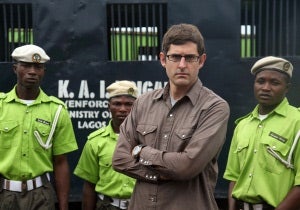The Weekend's TV: Single Father, Sun, BBC1<br/>Thorne: Sleepyhead, Sun, Sky 1<br/>Louis Theroux: Law and Disorder in Lagos, Sun, BBC2
Grief encounter hits home

Realism is a demanding business. On the outer edges of another universe entirely, when time is as malleable as silly putty, you can do pretty much anything you want and have the audience come with you.
Set a scene in an ordinary British household, though, and everyone's an expert. And while there are still narrative conventions that will give you quite a lot of leeway (soaps get away with murder in this respect, not least with regard to the frequency with which murders occur), a one-off drama series like Single Father sets the bar higher. If it isn't plausible there really isn't much point to it at all. After one episode, Mick Ford's four-parter, starring David Tennant as a recently bereaved dad, seems to be an odd mixture of realism and melodrama, alternating between note-perfect domesticity and scenes that snag at your suspended disbelief.
They got the toast right – or at least the odd unpredictability of toast consumption. In the pre-school rush of a family with four children, you saw Dave (David Tennant) at the daily task of cat-herding: "Nobody want toast?" he said puzzled. "I made a pile of toast." I've certainly been there, Dave, responding to consumer complaints about toast supply only to find that the market has mysteriously moved on. And Single Father gets a lot of this spot on – the clutter of belongings left on the stairs, the fact that the vital school permission letter is mentioned only as you're walking out the door, the rule that at least one parent always seems to be on duty as the grumpy one. Perhaps the marriage between Dave and Rita is a bit coffee-commercial sweet, its spats too easily resolved by devoted smooching, but then that's forgivable considering that it has only a few minutes to create a relationship that matters to us when it's stolen away.
It's a speeding police car that does it, screaming through a red light at 40 and catapulting Rita – cycling on her way to a maths exam – into a fatal somersault. As she tumbles towards the ground she just has time to mouth the words "I love you" before she hits, prompting an impulsive echo from Dave, who is halfway across town in the middle of tricky photo-shoot. That's one snag right there, if – like me – you're suspicious of psychic communications. And even if you're not you might encounter another snag when Dave vents his anger and his grief by driving his motorcycle dangerously fast through the rain-slicked streets late at night. I hope never to be in his position, but would suicidal recklessness really be an option for a man who now knows that he's the only parent left? It seemed like the kind of dramatic gesture that a fictional person can afford but a real one could not.
I did wonder too whether Rita's sister would have been quite so nakedly horrible and controlling in the immediate aftermath, though it's a sad truth that bereavement doesn't always make people behave well, and it turned out that she was right to have her suspicions of the new arrivals in the house. Several weeks after the accident, when Dave was with Rita's best friend, Sarah, consolation suddenly twisted into desire, and the two kissed. Nothing more as yet, because Ford's script seemed entirely believable here with both parties shocked by what they've done and pulling back into awkwardness and guilt. There's also a very moving scene with Dave's step-daughter Lucy, suddenly unmoored from the family by her mother's death. More than enough truth then – and truthful performances too – to compensate for the odd touch of melodrama.
In Thorne: Sleepyhead, David Morrissey plays a maverick detective inspector with a reputation for penetrating hunches. It's a mildly depressing sentence, that, I know, but Sky 1's new thriller, based on Mark Billingham's bestseller, is a cut above, as these things go. It's filmed in a hard brittle light by Stephen Hopkins – who keeps using his camera to catch Thorne from incriminating angles, as if he's a perpetrator not a policeman – and it's got David Morrissey in it, who can make pretty much anything believable, even when it tramples over procedural and bureaucratic realities. The plotline is serial-killer baroque, with a medically trained nutcase attempting to put young women into a vegetative state. His first attempts don't quite work, at which point he dumps them beneath an underpass somewhere with tell-tale bruises on their necks. But then he gets one right. After applying the unconventional therapy of screaming into her face from six inches away, Thorne jolts this victim into a minimal communication, so that he can begin the process of tracking the monster down. Natascha McElhone is on hand to provide some love interest, as an intensive care doctor who obviously isn't put off by big policemen who bully her most critical patients.
Louis Theroux: Law and Disorder in Lagos was mostly baffling – with occasional outbreaks of Therouvian comedy – such as the moment when a giant Nigerian gangster (sorry, trade union official) climbed into the car Louis was travelling in, his body language rather ambiguously poised between kidnap and amiability. "How do you do?" said Louis nervously. He often pretends to be puzzled to get more out of his interviewees, but I think he was genuinely lost here. The question you heard most frequently was "What's happening here?" often emerging from a jostle of "area boys" poised between jollity and violence. I don't think he ever really got an answer.
t.sutcliffe@independent.co.uk
Join our commenting forum
Join thought-provoking conversations, follow other Independent readers and see their replies
Comments